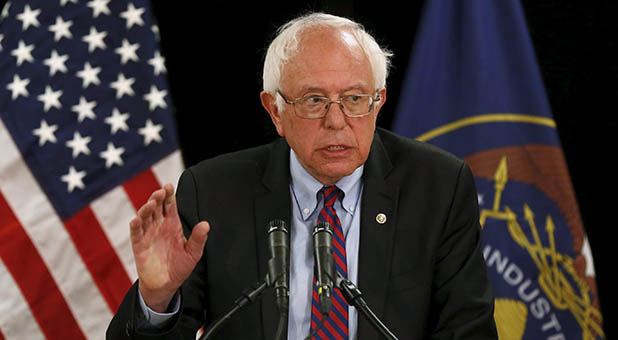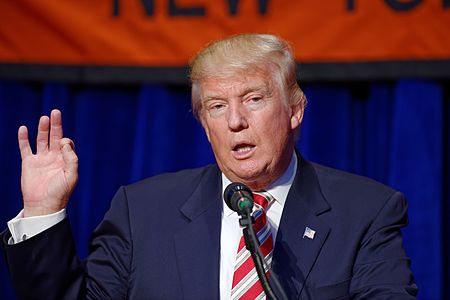
Bernie Sanders. Photo via Jim Urquhart/Reuters
The Donald Trump presidency has not exactly gotten off to the best start for fans of the natural and holistic health movement, if his early moves are any indication.
Among the most controversial was Trump’s hiring of Sonny Perdue, the former Georgia governor and big-time supporter of Big Ag who has taken hundreds of thousands in donations from such companies. Perdue is also a major supporter of factory farms chemical pesticides, and GMOs as well, according to the Organic Consumers Association.
Trump also recently signed an executive order that was criticized for easing restrictions on the GMO food industry.
Now, he’s made another controversial nomination — this time in the form of a pro-Big Pharma executive for a top government health post (one infamous in some circles for tripling the price on a top-selling drug for diabetics).
Big Pharma Exec. Now in Charge of Regulating Drugs and Drug Prices
According to this article from the Huffington Post, Trump is set to hire Alex Azar, the former head of drug conglomerate Eli Lilly, to serve as the next leader of the U.S. Department of Health and Human Services.

President Donald Trump. Via Wikipedia
Trump, in usual fashion, decided to tweet the news, stating that Azar will be a “star for better healthcare and lower drug prices.”
But Bernie Sanders, the Vermont Senator and former presidential candidate, is not so sure, posting the following on Facebook:
“At a time when the United States pays, by far, the highest prices in the world for prescription drugs, the last thing we need is to put a pharmaceutical executive in charge of the Department of Health and Human Services. The nomination of Alex Azar, the former head of Eli Lilly’s U.S operations, shows that Trump was never serious about his promise to stop the pharmaceutical industry from “getting away with murder.”
Sanders went on to state that Azar’s corporation, Eli Lilly, “dodged taxes while charging Americans outrageously high prices for life-saving prescription drugs.”
Azar, according to the Post article, has said in the past that insurers and prescription drug companies should work together to reduce drug prices without government intervention.
Now, however, he will be in charge of the organization that approves and regulates pharmaceutical drugs, leaving many to question whether whether he will live up to those ideals or continue business as usual in Washington, where the pharmaceutical industry spends far more on lobbying than any other industry.
Trump Pick “Tripled Prices on Insulin”
With Congress still set to decide on whether or not to approve Azar’s nomination, the question of whether he will better serve the people or the agendas of drug companies is being hotly debated.
Sanders for one does not have faith in Azar’s qualifications.
“We need an HHS secretary who is willing to take on the greed of the pharmaceutical industry and lower prescription drug prices, not one who has financially benfited from this greed,” he wrote on Facebook, adding that he will “vigorously oppose this nomination.”
While Trump has been critical of drug companies in public as noted by the Huffington Post, he has mostly “backed the industry’s rhetoric” and worked closely with industry lobbyists, the article continued.
Whether this strategy will ultimately lead to lower drug prices by the end of his term or more of the same remains to be seen, but Sanders, a longtime supporter of alternative medicine (and critic of Monsanto), clearly isn’t buying it.
Already, the website Politico has sounded the alarm noting that Azar tripled the price of a top-selling insulin drug while opposing measures to lower drug prices.
Big Pharma Spends More on Lobbying Than Any Other Industry
The question of how to reduce America’s dependence on prescription drugs is a tough one, but starting from the roots it appears as if drug companies simply have a better grasp on how to manipulate the system in their favor.
From TV news reports to magazine ads and commercials, the industry is seen by a huge portion of the population as the only choice for health solutions when something is wrong inside the body.
This monopoly is being cut into by alternative media and holistic medicine, but supporters of a more natural route are fighting an uphill battle, in large part due to industry lobbying.
According to the website OpernSecrets.org, the pharmaceutical industry spent over $200 million in lobbying in 2017 alone, more than $80 million more than the next highest industry, insurance.
Going back to 1998, the industry spent over $3.7 billion on lobbying, making it far and away the number one spender for influencing politicians, with insurance coming in second having spent over $1.1 billion less in the same time frame.
Considering how much these industries spend on political influence, it’s no wonder that the consumer continually gets the short end of the stick, no matter how much critics like Sanders and even Trump rail on pharmaceutical companies and their way of doing business.
At the end of the day, this is an issue that will be decided much like any other — through the will of people who decide to step outside the box and learn how to handle things outside of a system that has clearly become corrupt, inefficient, and riddled with problems stemming from too much industry influence, and, as Sanders pointed out, too much blind faith in the system.
Let us know your thoughts in the comments section below, or on Facebook here. You can also subscribe for more articles like these in your inbox by clicking here.
Thanks for installing the Bottom of every post plugin by Corey Salzano. Contact me if you need custom WordPress plugins or website design.




